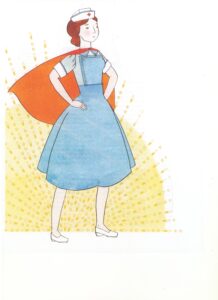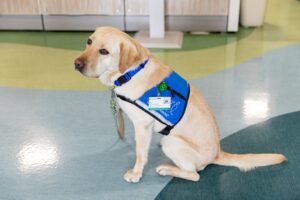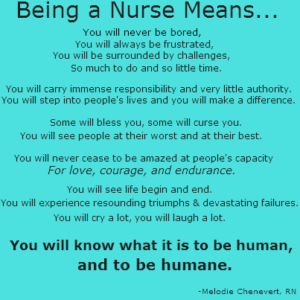 Dr. Friese is Assistant Professor at Rush University. “I teach nurses in Rush’s Doctor of Nursing Program and the generalist intro master’s program.”
Dr. Friese is Assistant Professor at Rush University. “I teach nurses in Rush’s Doctor of Nursing Program and the generalist intro master’s program.”
“My major areas are LGBTQIA+, veterans with disabilities—that includes veterans who might identify with the transgender population,” says Tanya “Doc” Friese, DNP, RN, CNL USN (Ret.).
Along with courses in the College of Nursing, she also teaches in both the College of Occupational Health and the College of Medicine. She is Community Liaison of Rush University Medical Center’s LGBTQ Health Committee.
From the Navy to Nursing
Doc got into nursing later in life. She worked as an accountant before joining the military as a Navy Corpsman before the first Gulf War.
“I knew the first Gulf War was coming. I didn’t have children. I didn’t have an attachment. I wanted to go do what I could do. So I did that.”
While serving during the war, she applied to nursing school.
“I knew I could be an officer, and I always wanted to be a nurse. The war did some things to my body that did not allow me to continue. I retired from the United States Navy as a corpsman. Corpsmen are the people who take care of everybody in the Navy, everybody in the Marines.”
After working as a scientist, she decided to get out of the laboratory and go back to taking care of people.
“I missed people. Rush had this one-year nursing program. I signed up at 40-something years old. I went on and got a master’s so I could teach. Then I got a doctoral degree. That’s what drew me into nursing—was the fact that I care and that I believe I make a difference.”
Honoring Identity in Healthcare
For Doc, taking care of people includes honoring and supporting all aspects of their identity.
“It’s not our job to judge you; it’s our job to assist you in understanding who you are and how we need to get you there.”
And that begins with the health assessment.
“In nursing 101. In doctor 101. In OT 101. If you’re assessing me, I would appreciate if you would ask me my gender identity. I would highly appreciate if you would ask me how I identify as. I would appreciate if you would ask me if I was a veteran.”
She continues. “There’s a lot of things about people that when we all experience life and get older, we understand are important to our wellness. In my culture—Lakota Sioux—we don’t necessarily have acknowledgement of Two-Spirit people, but it’s there. And yes, this is a huge thing for me. I believe people should be able to express themselves in whatever nature.”
She’s taking that passion and respect to the classroom and bringing the next generation of healthcare workers alongside her.
“A really important project that I just started working on is with women’s and children’s departments across all of the Colleges. We’re taking an existing program and updating it related to early transgender identity. This is something that I was very happy that they reached out to me to talk about.
“The plan is to have a segment within the course for our doctor of nurse practitioners and women and children’s health to understand the fact that children, younger people, when somebody says this is what they identify as, you can identify as who you are and there’s a lot to consider before starting a hormonal transition.”
Another major initiative was expanding breast cancer prevention awareness in October.
“One of the other major initiatives I did with my current students was for breast cancer awareness. Men can get breast cancer, too. So we actually had some of my men who identify as men go up to other male teachers at the schools that I work at and let them know they need to do the two-finger check.”
As a veteran working with the VA, Dr. Friese has had the opportunity to continue her educational and advocacy work for transgender veterans.
“Going back to people are people, and we just do our jobs and eventually maybe we can become who we are, the transgender veterans I’ve built relationships with are amazing individuals and amazing examples of people who are transgender.”
Seeing Progress
She’s seeing transgender advocacy pay off in other areas of healthcare in Chicago as well.
For example, in the juvenile temporary detention center, which is the largest juvenile detention center in the country, Rush and UIC have done a lot of education with the staff, including guards, understand that transgender identity.
“All the nursing staff, which comes from the county health system, have now been educated. So there’s now an ongoing continuing education that’s required on an annual basis. If a kiddo comes in and they’re like whatever they are, then they’re allowed to be whatever they are. Staff get this annual education to understand that. That’s something that didn’t happen 10 years ago. I think that’s really cool,” she says.
On the Responsibility of Nurses
Regardless of where nurses work, nurses must respect and advocate for the patient.
“You enlist to care for those under your charge, regardless of where they come from and where they are going to. You respect their choices and offer your expertise so that they are able to make the best possible choices for themselves—and again, you respect that.”
Caring for the patient also means including the patient’s family, values, and worldview.
“You take into account in the care plan, their family—however defined—to include their animal companions, how they experience the world, and whatever else matters to that individual,” she explains.
Doc’s deep understanding and passionate advocacy for patients is woven throughout her teaching, and she expects nothing less than the best from her students.
“So this is why I am a nurse and why the students I teach in all Colleges at Rush both love and fear me, because I want them to graduate with compassion, empathy, skills, and scholarship abilities. I want them to assist in making this world a better place, and I want them to care and to truly listen when someone needs to just share.
“This is a military saying that I push over to my students. Nursing is like a branch of the military. The toughest job you’ll ever love.”



